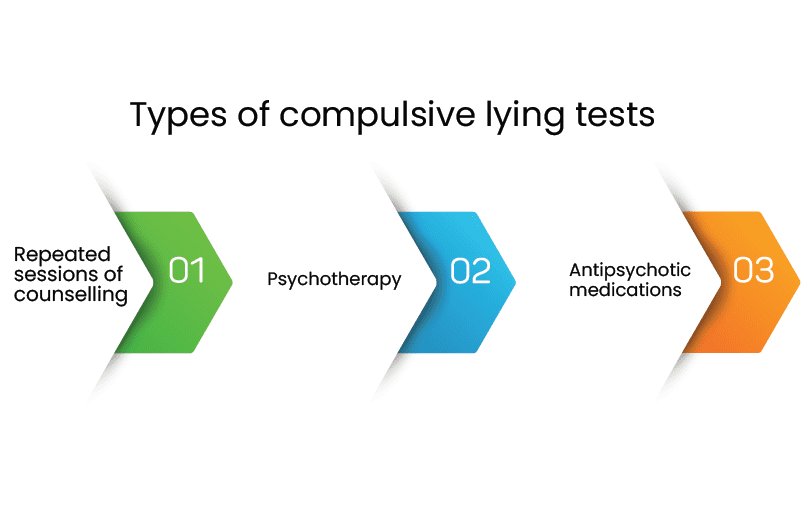Introduction
Dealing with a compulsive liar can get stressful. But when there are addressing underlying issues with therapy, results are noticed over time. Everyone lies, at some time or another. It can be because you don’t want to hurt someone or because you don’t want to get into trouble for something you have done. But these lies are a part of life. However, lying without reason can be a sign that the person is a pathological liar[2].
It is difficult to make a diagnosis of this disorder because there can be many causes for this affliction. And, as the person tends to lie, interviews may not be enough, and it is necessary that we have to know the history of the patient minutely. A vital part of this diagnosis is trying to find out if the patients are aware that they are lying or if they believe their lies to be the truth.
A polygraph test[4] is used by some therapists not to catch the patient in a lie but to find out if they are capable of beating the polygraph[5]. This can suggest that they believe the lies they tell.
Am I a compulsive liar? Signs of a compulsive liar [1]
You may wonder if you need an ‘am I a compulsive liar test’ Here are a few telling signs that may suggest a person is a compulsive liar. These are:
- The lies are based on an element of truth but have a lot of trimmings.
- The lies may be small, to begin with, but grow with time. After discovering the patient’s untruths, their lies become more fanciful so that the initial discrepancy can be covered up.
- By and large, there is no external incentive for the lies. In cases where there is an incentive, it seems insignificant when compared to the intricacy of the lie.
- Lies could be a way to gain attention or sympathy. Lying about a debilitating disease or death in the family are examples.
- Lies are used by patients to portray themselves in a positive light. Knowing rich people, pretending to be rich, or lying about extensive travel, are some examples.
Know More About How to deal if your child is a compulsive liar
Compulsive liar test: Diagnosing a compulsive liar
Compulsive liars lie out of habit, and a compulsive liar test can be a good diagnostic tool to confirm this diagnosis.
- To a compulsive liar, it’s all about twisting the truth, no matter how small the matter. They may feel uncomfortable with the truth, and in retrospect, it feels good to lie.
- The habit of lying may have developed in early childhood. This may be because the child was living in an environment that made lying necessary.
- Confronting the truth can be difficult for them, and lying is their way out.
- While compulsive liars don’t necessarily have a mental disorder, it has been noticed that people with bipolar disorder, ADHD, or borderline personality disorder, tend to lie compulsively.
- Compulsive liar disorder tests will tell you that the patients lie out of force of habit and are not manipulative or sly.
- They display lying patterns, such as breaking into a sweat or avoiding eye contact. They are confused and flounder over words when they lie.
- There is no obvious reason for their lies, and they don’t gain anything from it. They make up lies as they go along, choosing to tell people what they think they want to hear.
- They are aware of the difference between lies and reality.
Read More About How to Deal if Your Partner is a Compulsive Liar
While they may admit to lying when they are challenged, this will not stop them from lying again. As they make up lies as they go, their stories generally don’t add up, and it is easy to know that they are lying.
Types of compulsive lying tests
Many diagnostic compulsive liar tests online can confirm that a person is a compulsive liar. However, for the treatment to succeed, the patient has to agree that they are a compulsive liar or a pathological liar. The therapist may ask the patient if they are lying to feel better themselves or to make sure the other person doesn’t feel bad. While treating the patient, the therapist may use a combination of treatments. The treatment may consist of:
- Repeated sessions of counselling
- Psychotherapy
- Antipsychotic medications are often used along with counselling or psychotherapy sessions
- Along with therapy, support from friends and family is necessary for better results
During counselling sessions, the therapist may ask questions that help the patient identify the emotions, situations, and scenarios that trigger lying. Once the identification of triggers, the patient can study them objectively and respond to them mindfully.
Is the test for compulsive lying and pathological lying the same?
If the pathological liar is left untreated, they can develop compulsive lying disorder. Most people suffering from compulsive lying disorder are in denial about their condition. This becomes challenging, as it is difficult to cope with a situation where you don’t know what to believe. Pathological liars are not easy to diagnose, and therapy may be needed to get to the root of the problem.
Compulsive lying disorder can be treated with Cognitive Behavioral Therapy (CBT), Dialectical Behavioral Therapy (DBT), and medication. A point to note, everyone who lies may not be suffering from this disorder.
How to help a compulsive liar to make him stop lying
Treatment for a compulsive liar is best conducted by a therapist. Support from friends and family is essential as there is a stigma associated with lying. The patient may need to be convinced that they need help. Since it is a sensitive issue, it has to be handled delicately. The therapist will conduct a background check to decide on the mode of treatment. They will review the following issues:
- Analyze the pattern of lies to understand the reason behind the issue better
- Check the trigger points
- Advise the patient to take it one day at a time to allow them to de-stress
- Let patient exercise restrain by setting goals and sticking to them
- Make the patient understand that they don’t need to share everything, even if it’s the truth
- Explore the aim of the lie to verify trigger points
Online treatment for compulsive lying and pathological liars
Online treatments are ideal for treating compulsive and pathological liars. After an initial evaluation, the therapist will suggest any of the following modes of treatment for Compulsive Lying Disorder.
Cognitive Behavioral Therapy (CBT)
CBT or Cognitive Behavioral Therapy is recommended for patients with this disorder. As compulsive liars are often made fun of, it is essential to be understanding and sensitive to the issue.
Dialectical Behavioral Therapy (DBT)
DBT has shown promising results in treating both pathological<>sup>[3] and compulsive liars.
Medication
When underlying issues such as phobias, anxiety, or depression are involved, the therapist may suggest medication as an avenue of treatment.
Compulsive Lying: The Road Ahead
Dealing with compulsive lying disorder can be traumatic, not only for the patient but also for the surrounding people. For online treatment, get in touch with experts from United We Care. Seeking help from a therapist is of the utmost importance.
References
| [1] | B. J. Oommen, G. Raghunath, and B. Kuipers, “Parameter learning from stochastic teachers and stochastic compulsive liars,” IEEE Trans. Syst. Man Cybern. B Cybern., vol. 36, no. 4, pp. 820–834, 2006. |
| [2] | “Pathological Liar – shan’s shenanigans,” Shan’s Shenanigans. [Online]. Available: https://shansshenanigans.wordpress.com/tag/pathological-liar/. [Accessed: 01-Aug-2022]. |
| [3] | C. C. Dike, M. Baranoski, and E. E. H. Griffith, “Pathological lying revisited,” J. Am. Acad. Psychiatry Law, vol. 33, no. 3, pp. 342–349, 2005. |
| [4] | W. Bernet, “False statements and the differential diagnosis of abuse allegations,” J. Am. Acad. Child Adolesc. Psychiatry, vol. 32, no. 5, pp. 903–910, 1993. |
| [5] | J. Shattuck, P. Brown, S. Carlson, and American Civil Liberties Union, The lie detector as a surveillance device. American Civil Liberties Union, 1973. |












